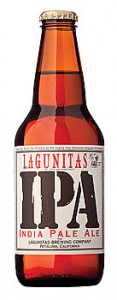
The Golden State just recorded its driest year ever and if some heavy rain doesn’t fall soon, Bay Area craft brewers that rely on fresh water from the Russian River could be forced to find an alternative water supply, which could negatively impact quality.
One of California’s largest craft breweries, Petaluma-based Lagunitas, sources fresh water from the Russian River to brew its signature IPA and other offerings, but possible shortages could dictate a switch to well water that lacks the same taste.
Jeremy Marshall, head brewer at Lagunitas, told NPR that minerals found in the groundwater don’t mix well with the beer.
“It would be like brewing with Alka-Seltzer,” he told the news organization.
The article adds that Lake Mendocino is a major source of inflow for the Russian River, but the reservoir could “all but disappear” this summer if there isn’t some heavy rainfall.
Of course, water isn’t the only ingredient in beer and in Michigan, a new non-profit association established by the economic development organization, The Right Place, along with other area partners, is aiming to increase the supply of hops grown in the region.
The Michigan Hop Network issued a press release this week in which it outlined plans to conduct educational programs on commercial hop growing and processing. The organization also aims to enlist the support of higher education institutions and other groups to further develop the interest of Michigan hop growers and craft brewers.
“As our industry continues to build in Michigan, growing and producing quality hop products will be critical to long-term success,” said Jeff Steinman, owner of Hop Head Farms and the board chair of Michigan Hop Network. “Our goal is to ensure that Michigan growers and processors produce amazing products and establish Michigan as a destination for quality hops.”
The release adds that while most of the 30,000 acres of hop farms across the country are located in the craft hotbed of the Pacific Northwest, Michigan hops are “quickly becoming a strategic advantage for many craft brewers throughout the Midwest”
In 2013, more than 200 acres of commercial hops were grown in the state and 100 more acres are planned for this year. To support this growth, 10 harvesting centers and eight processing operations have been established throughout the state.
“If Michigan growers can provide high-quality hops and provide consistency in quantity, the sky is the limit for our industry here,” said Rick Chapla, vice president of business development, The Right Place. “The Michigan Hop Network supports this emerging industry in the state, and provides the collaboration and education needed to its members.”
Meanwhile, in New Hampshire, some industry professionals are less concerned with how beer is made and more with how it’s advertised.
State Representative Adam Schroadter is pushing to lift a “weird holdover law” still lingering from Prohibition that bans billboards that display alcohol, according to Seacoast Online. The Senate approved the bill earlier this month, the article added.
The Beer Distributors of New Hampshire has met the bill with opposition, however, arguing that its passage could have “negative consequences” for minors and threaten the state’s family-friendly reputation.
“Both of these unintended consequences could negatively impact the tourism sector, the greater economy and New Hampshire’s bottom line for years to come,” said Scott Schaier, executive director of the Beer Distributors of New Hampshire.
He added that the state’s current reputation took a “long time to build,” but it could be “lost very quickly if we are not careful to protect it.”
“I can’t imagine that the general public has much interest in repealing the current law.
Schaier is also one of the organizers of the new nonprofit marketing cooperative BrewNH (Brewers, Retailers, Entrepreneurs and Wholesales of New Hampshire), which aims to boost the state’s craft beer economy.
He told Brewbound in January that the group is focused on “promoting local businesses in the craft brewing sector.”
“That’s really the opportunity here,” he said at the time. “It’s about supporting state businesses and supporting the state economy.”
In an email to Brewbound, Schaier said many brewers in the state have also “logged their personal opposition to this bill as they, too, fear erosion of NH’s premium tourist product and the potential negative consequences associated.”
“A[s] a pro business association, we just want to make sure all the macro-economic and social factors are considered and the state’s long term interests are protected before a long held alcohol policy restriction is lifted for a special interest group.”
Rep. Schroadter argued that lifting the bill would do just that, claiming billboards were an “effective sales channel” for marketing beer when he served as a marketer for the Los Angeles Kings hockey team.

President Barack Obama, in announcing a $70 million federal grant for a Chicago Digital Lab to be built on the city’s Goose Island (the actual island, not the brewery), the POTUS used the moment as an opportunity to boost the beer brand as well, according to the Chicago Sun-Times.
“So this digital manufacturing and design innovation is going to be headquartered not far from downtown Chicago on Goose Island, where there is also a very superior beer in case you — I’m just —- I’m just letting you know,” he said. “A little hometown plug there. Feel free to use that, Goose Island.”
This isn’t the first time Obama has shown some love to the brand.
In 2010, Obama and British Prime Minister David Cameron drank its 312 Urban Wheat Ale in meetings together.
“It’s our best-selling beer,” said Gregory Hall, former brewmaster at Goose Island. “I expect after all the excitement over the Obama-Cameron beer summit, we will see that rate of growth continue to climb.”
